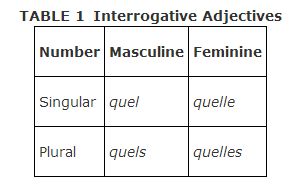- Jeanne est‐elle brune? (Is Jeanne a brunette?)
- Les livres ne sont‐ils pas bons? (Aren't the books good?)
Interrogative adjectives, adverbs, and pronouns
Use interrogative adjectives, adverbs, and pronouns to ask for information.
The interrogative adjective quel (which? what?), shown in Table 1, agrees in number and gender with the noun it modifies.

Quel may be followed by est‐ce que or inversion:
- Quel genre de film est‐ce qu'il préfère? (Which type of film does he prefer?)
- Quel genre de film préfère‐t‐il? (Which type of film does he prefer?)
In colloquial French, quel + a noun may be placed at the end of the phrase to form the question: Tu préfères quel genre de film? (Which type of film do you prefer?)
Quel may also be preceded by a preposition:
- De quel film est‐ce qu'il parle? (Which film is he talking about?)
Être is the only verb that may separate quel from its noun:
- Quel est ton nom? (What's your name?)
- Quelles sont tes coordonnées? (What's your name and address?)
The interrogative adverbs comment (how?), combien (how much/how many?), quand (when?), où (where?), d'où (from where?), and pourquoi (why?) can be used before est‐ce que or inversion to ask questions. In colloquial spoken French, however, they are often placed after the verb:
- Combien est‐ce que cette jupe coûte?
- Combien cette jupe coûte‐t‐elle?
- Cette jupe coûte combien?
The three examples above all ask, “How much does this skirt cost?”
With combien, comment, où, d'où, and quand (but not with pourquoi), a question may be formed by inverting a noun subject with a verb that has no object:
- Combien coûte cette jupe?
Qui is used for people, while qu'est‐ce qui (the subject of the sentence), and que/quoi (the object of the sentence) are used for things. The i from qui is never dropped, whereas que becomes qu' before a vowel or vowel sound:
- Qui est tombé? (Who fell?)
- Qu'est‐ce qui est tombé? (What fell?)
- Qui aimes‐tu? (Whom do you love?)
- Qu'aimes‐tu? (What do you love?)
- Tu aimes quoi? (What do you love?)
The variable interrogative pronoun lequel ( laquelle, lesquels, lesquelles) must agree in number and gender with the noun to which it is referring:
- Laquelle de ces jupes achète‐t‐elle? (Which of these skirts is she buying?)
Contractions are used with the prepositions à (to) and de (of, from):
- Auxquelles de ces pièces es‐tu allé? (To which of these plays have you gone?)
- Duquel de ces hommes parle‐t‐elle? (About which of those men is she speaking?)